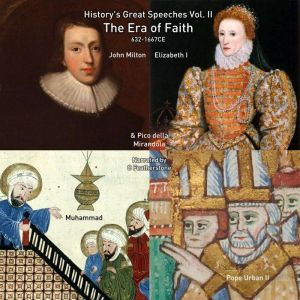
List: $4.00
| Sale: $2.80
Club: $2.00
The Era of Faith
632-1667CE
Author: Muhammed, Pope Urban II, Elizabeth I, John Milton, Pico della Mirandola
Series: History's Great Speeches #2
Narrator: Charles Featherstone
Unabridged: 1 hr 33 min
Format: Digital Audiobook Download
Publisher: Brimir & Blainn
Published: 06/29/2023
Category: Literary Collections - Speeches
Includes:
Bonus Material
![]()
Synopsis
Five speeches from a millennium shaped by faith and empire.632CE. In Muhammed’s farewell address, he lauds his people for their achievements and virtues, and gives them his final instructions for living within the faith.In 1095, Pope Urban II’s Against The Infidels speech launches the Crusades, which lasted for another two hundred years. In it the Pope exhorts his clergy to make true the promise of Christianity and rise against their weaker natures and the enemy in the east.Pico della Mirandola’s Oration On The Dignity Of Man has been described as “the manifesto of the Renaissance”, and is an introduction to his 900 Theses, which was the first printed book ever banned by the Church. Written in 1486, it weaves together philosophy and theology from across history and the world. While Christian, it is a review of the philosophies and religions of the ages.The first section details man’s supremacy over all other beings but God, due to his inherent mutability. The second section dives into the value of philosophy and theology, preparing a discussion of Christian magic and mystery. The final section explores a positive conception of Christian magic, placing it in ancient traditions of magic.In 1588, Elizabeth I’s speech rouses her forces against the Spanish Armada. The Armada came to conquer England and re-establish Catholicism as the state religion. The ensuing conflict is one of England’s great military victories. It includes the famous line “I know I have but the body of a weak and feeble woman; but I have the heart of a king, and of a king of England, too”.John Milton, Satan’s First Speech, Paradise Lost, 1667. We end the volume with a speech against faith and monarchy, which gives us the phrase “Better to reign in Hell, then serve in Heav'n.” Paradise Lost explores the limits of both divinity and monarchy, and marks the end of an age where the two combined to rule the world.